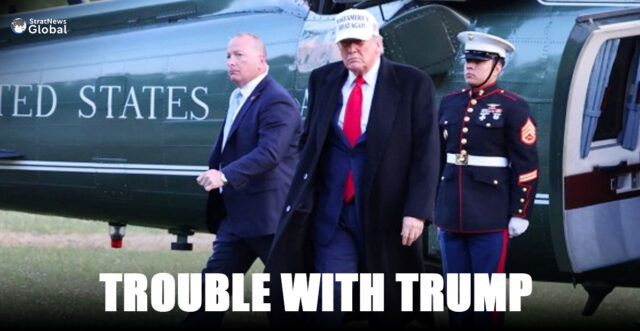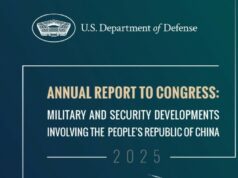A freshly released Pew Research Center report paints a sobering picture: just 34% of respondents across 24 countries say they have confidence in U.S. President Donald Trump to “do the right thing in world affairs,” while 62% trust him little or not at all.
The global favourability of the U.S. has slid toward parity—49% view it favourably, and 49% unfavourably. The implication is stark: leadership defined by muscle without trust proves hollow.
Here’s a paradox straight out of a political chessboard: 80% of global respondents describe Trump as “arrogant”, while 65% find him “dangerous”—yet 67% still acknowledge his strength. It’s akin to admiring a weapon’s power—until it’s aimed at your own foot.
And therein lies the problem. Strength without restraint doesn’t win allies—it breeds caution. And even when that strength brings short-term gains, it leaves strategic erosion in its wake.
Trust in Trump has cratered in Mexico (down over 20 points), Canada, Germany, Spain, Sweden, and more. Meanwhile, he remains “strong” in countries like Nigeria (79%), Kenya (74%), Israel (69%), Hungary (53%), and India (52%). The message: where politics lean populist, Trump resonates. But among advanced democracies—Canada, Western Europe, Japan—it’s a trust collapse.
This “strongman is better than no man” mindset only works so long as strategic interests align. In life-or-death situations like climate change (21% confidence), U.S.-China tension (32%), Ukraine (33%) or immigration (36%), global faith has evaporated. Strength without substance is a mirage.
French Senator Claude Malhuret quipped that Trumpian America now resembles “instability we used to see abroad”. In parallel, countries like Canada are recalibrating toward Europe, Germany and Japan are diversifying supply lines, and even India—wary of unpredictable U.S. policies in areas from trade to climate—is quietly hedging.
When 70% of Canadians believe the U.S. no longer considers their interests, and similar doubts grip Europeans, what you have isn’t just a dip in trust—it’s a major structural realignment.
Approximately half of those surveyed maintain that American democracy still works, but 46% disagree. That split reflects a growing global perception: U.S. governance is increasingly erratic and less reliable.
V‑Dem and the Economist’s Democracy Index have downgraded the U.S. to a “flawed democracy,” citing executive overreach, weakened institutions, and rule-of-law erosion. When your democracy is viewed as unstable, your leadership loses legitimacy, not just locally, but globally.
Here’s where the calculus gets cold: populism may secure applause in some corridors, but flattens credibility abroad. That is the trap Trump’s America walks. Scholars like Thomas Zimmer note that the admiration from far-right factions abroad is a political badge—not a strategic asset.
Meanwhile, foreign investors, students, migrants, and diplomats are already asking: is this a reliable anchor or a political gamble? Standards of cooperation, predictability, and rule-following matter far more than flash.
So what’s the roadmap?
- Normalize Diplomacy
Leadership needs more than toughness. It needs credibility. Allies crave predictability. Without it, trade agreements stall, climate deals falter, and trust agreements crumble. - Trust through Consistency
America may still be seen as stronger than China or Putin globally, but “strong” means little if it’s capricious. Consistent policy, measured diplomacy, and actionable commitments rebuild the scaffolding of trust. - Translate Strength into Reliability
It’s not enough to say “America First.” It matters how it’s applied. Allies want reassurance that U.S. muscle will defend shared values—not destabilise them.
Pew’s findings are a wake-up call. Strength without reliability breeds fear—not respect. A global leader is not someone who dominates; it’s someone who earns trust.
In this crisis, muscle without moral gravitas is empty. To lead again, America must restore not just its power, but also its credibility.
And time is running out.
In a career spanning three decades and counting, Ramananda (Ram to his friends) has been the foreign editor of The Telegraph, Outlook Magazine and the New Indian Express. He helped set up rediff.com’s editorial operations in San Jose and New York, helmed sify.com, and was the founder editor of India.com.
His work has featured in national and international publications like the Al Jazeera Centre for Studies, Global Times and Ashahi Shimbun. But his one constant over all these years, he says, has been the attempt to understand rising India’s place in the world.
He can rustle up a mean salad, his oil-less pepper chicken is to die for, and all it takes is some beer and rhythm and blues to rock his soul.
Talk to him about foreign and strategic affairs, media, South Asia, China, and of course India.





